Influencer marketing is evolving at a breakneck pace, and AI-powered tools are the game changers brands need. In 2025, leveraging AI influencer marketing tools can transform how Influencer campaigns are planned, executed, and measured, saving time and driving higher ROI. These tools help discover the right influencers, analyze audience quality, automate outreach, manage contracts, detect fraud, and optimize overall campaigns with data-driven insights.
Here is an in-depth exploration of the top AI tools for influencer marketing today each with a description, core features, pros, and cons to help you amplify the impact of your influencer campaigns with the power of AI.
Why You Need AI-Powered Influencer Marketing Tools?
Imagine manually searching for the perfect influencer, sorting through thousands of profiles, guessing engagement authenticity, and handling campaign communications – exhausting, right? This is where AI tools come in.
Artificial intelligence solutions simplify influencer discovery by evaluating huge quantities of social data, removing deceptive followers, and matching influencers to your target audience in the same way that a matchmaking wizard does. They deliver predictive analytics to forecast campaign success, track real-time performance, and simplifies contract and payment procedures with built-in automation.
They also provide outstanding efficiency, allowing marketers to focus on creative strategy while AI does the heavy job. According to recent statistics, more than 78% of marketers now employ AI-powered systems to manage influencer campaigns, up from 38% just a few years ago and an encouraging sign of evolving industry standards.
Are you ready to change your influencer marketing? Let us look at the 14 greatest AI tools that are transforming influencer campaigns and enabling brands to achieve unparalleled reach and ROI in 2025.
1. Influencity
Description:
Ever tried to organize chaos? Influencity sorts it for you. Seriously sifting through influencers sucks. Influencity uses AI. Finds legit profiles. Breaks down audience details. Big reach. Keeps things real. You’ll see dashboards for everything. Filter options crazy detailed. Fake followers? It checks, so you don’t waste cash. Smooth workflow, too.
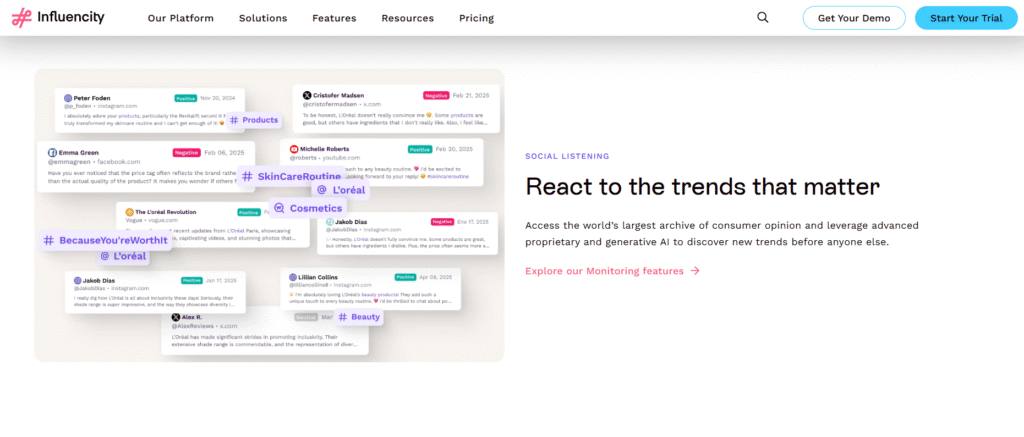
Team approves, messages, and tracks all in one place. Numbers talk, and Influencity shows them live. Friendly interface, mostly. Sometimes you get lost, though. Not cheap. For small brands? Might sting. But for those needing depth and control—it’s a quiet powerhouse. Your campaigns, simplified. Feels like cheating.
Core Features:
- AI-powered influencer search with 70+ filters
- Audience analysis to evaluate follower quality and engagement
- Fraud detection to eliminate fake followers and bot activity
- Campaign management dashboard for communication and approvals
- Real-time analytics and report generation
Pros:
- Extensive influencer database worldwide
- High accuracy in audience and engagement analytics
- Strong fraud detection capabilities
- Intuitive user-friendly interface
Cons:
- Pricing may not be affordable for small businesses
- Some users report a learning curve initially
2. Heepsy
Description:
Sometimes you crave simple but effective. That’s Heepsy. Searching for influencers can be a jungle. Heepsy’s AI cuts a path through it, finding creators by location, niche, and engagement. It’s perfect for small businesses or newbies easy on the wallet, easy to use. The fake follower detection helps avoid wasting money.
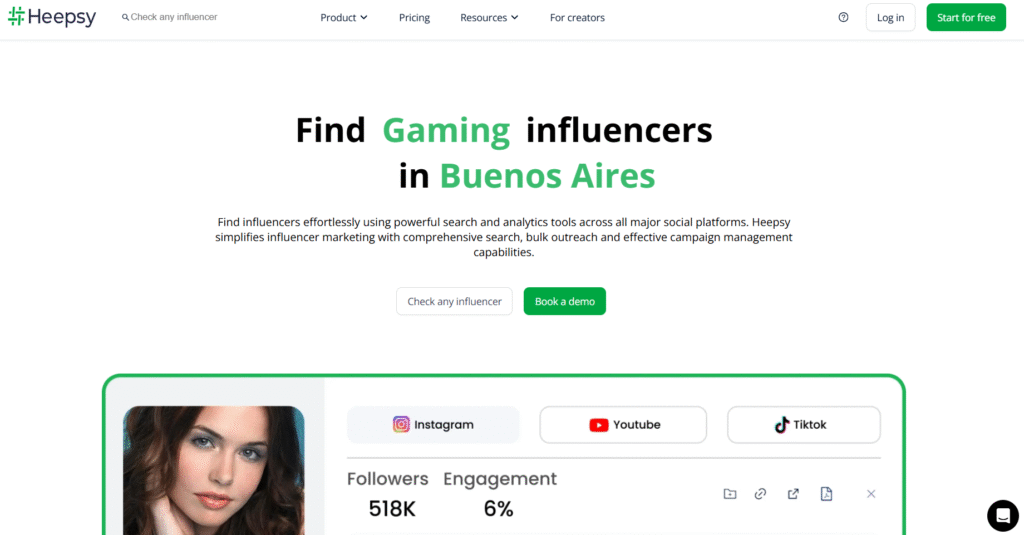
Heepsy covers Instagram, TikTok, YouTube the essentials. But don’t expect fancy campaign workflows here. It’s like a sharp tool in your kit, not the whole workshop. Reliable, straightforward, and handy for honest influencer hunts.
Core Features:
- Smart search filters for location, category, engagement rate
- Detailed audience demographics and authentic follower percentage
- Fake follower detection algorithm
- Exportable reports and lists for campaign planning
Pros:
- Easy to use, ideal for beginners
- Affordable pricing for small to mid-sized brands
- Transparent influencer insights
- Multi-platform capability (Instagram, TikTok, YouTube)
Cons:
- Limited advanced campaign management features
- Smaller influencer database compared to enterprise tools
3. Modash
Description:
Modash is all about trust in influencers. Wondering if an influencer’s audience is real? Modash’s AI doesn’t just wonder it audits, verifies, and tracks over time. It’s like having a watchdog for your campaign integrity. Historical data helps tweak your approach on the fly no more guesswork.
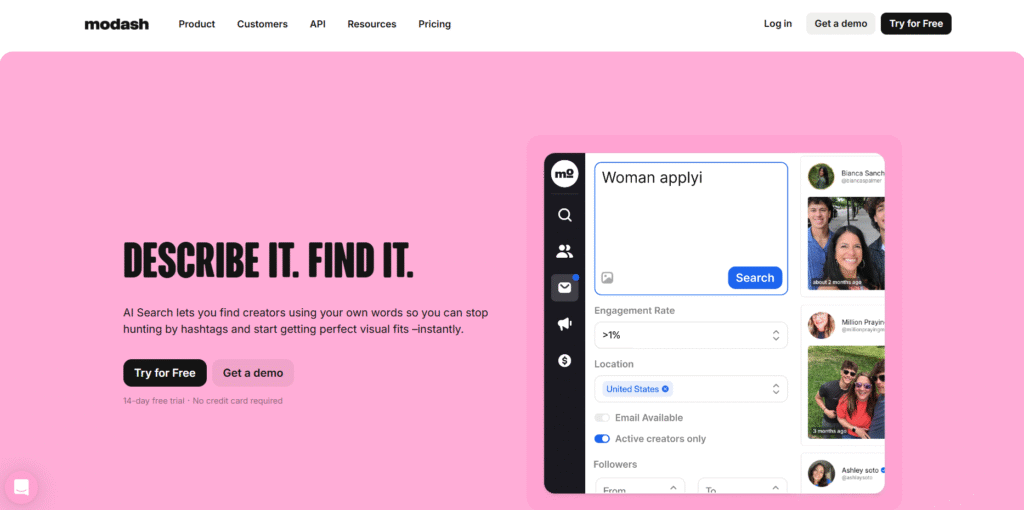
Plus, it automates outreach and offers team collaboration tools. The interface feels busy at first but stick with it. Modash focuses on authenticity more than creative flair, so if you want pure verification with some workflow perks, this fits.
Core Features:
- Real-time influencer verification and audience audits
- Historical performance tracking
- Campaign management and collaborative workspace
- Influencer outreach automation
Pros:
- Robust fraud detection, reducing fake follower risks
- Continuous performance insights
- Streamlined collaboration among teams
- Flexible pricing tiers
Cons:
- Interface may feel complex initially
- Focused more on influencer verification than creative tools
4. Tagger by Sprout Social
Description:
Tagger plays both brains and brawn. Mixing AI with social listening, it dives deep into audience data to find influencers who truly fit your brand no guessing. Predictive ROI tools help justify spends well before campaigns launch. Plus, you get smooth workflows for content planning, contracts, and payments.
If you’re a big brand or agency, Tagger’s robust analytics and multi-platform reach shine. But, its price tag might scare off smaller players. It’s a powerhouse with premium polish, for those who want sharp insights and full funnel control.
Core Features:
- AI-driven influencer discovery with social listening integration
- Predictive campaign ROI and impact analysis
- Audience segmentation and demographics
- Content calendar and workflow tools
- Integrated payment and contract management
Pros:
- Industry-leading analytics and insights
- End-to-end campaign workflow support
- Supports diverse social platforms
- Reliable and scalable for large brands
Cons:
- Premium pricing limits access for smaller businesses
- Might have features that some teams won’t use fully
5. Upfluence
Description:
Think of Upfluence as your AI marketing sidekick. It’s got that e-commerce focus, integrating customer data so influencer matching hits the mark. Their ChatGPT-powered assistant isn’t just smart it helps craft messages and brainstorm content ideas. You get solid audience analytics, automated contracts, and payment processing, all in one place.
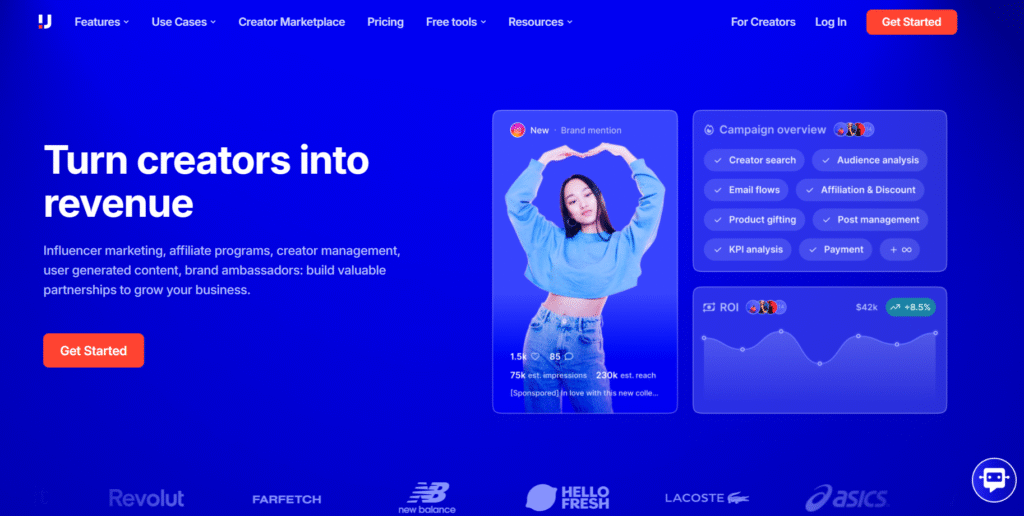
It’s packed with features, honestly. So yeah, there’s a learning curve, and the price reflects the love. But save time, find fitting influencers, and watch your campaigns flow smoother. Perfect for D2C brands wanting a clever edge.
Core Features:
- AI-powered influencer discovery and audience analytics
- ChatGPT-driven content and outreach assistant
- Customer data integration for precise targeting
- Automated contract generation and payment processing
- Comprehensive campaign reporting dashboards
Pros:
- Combines AI with human insights effectively
- Strong e-commerce focused features
- Saves time with automation at every step
- Scalable from small businesses to enterprise
Cons:
- Steeper learning curve due to rich feature set
- Higher price point
6. CreatorIQ
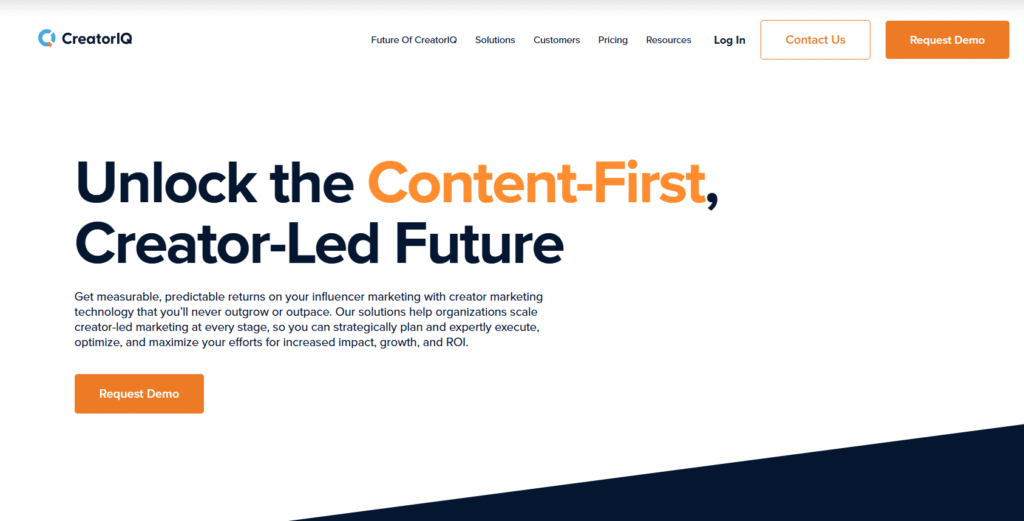
Description:
Big company vibes with CreatorIQ. Its AI uses machine learning to forecast how influencers will perform think of it as a crystal ball for ROI. The platform is made for enterprises that need deep data and scale. You get custom reports, API integrations, and top-tier support. Sophisticated? Heck yes. Overwhelming for newbies? Also yes. It’s pricey but justifies the cost with sharp analytics and campaign muscle. If your budget and team can handle it, CreatorIQ is like a luxury car for influencer marketing powerful, precise, and premium.
Core Features:
- Machine learning-driven audience insights
- Predictive analytics for campaign success forecasting
- Enterprise-grade campaign management tools
- Custom reporting and API integrations
- Dedicated support and onboarding
Pros:
- Highly sophisticated analytics and forecasting
- Great for large-scale influencer marketing operations
- Supports diverse social media platforms
- Strong customizability and support
Cons:
- Expensive, reserved for large companies
- Complexity may overwhelm smaller teams
7. Affable.ai
Description:
Asian market lovers, meet Affable.ai. Focused on that region but growing globally. It’s smart uses AI to profile audiences, assess content tone, and keep brand safety tight. Multilingual and region-savvy, it helps global brands tap local voices without the usual risks.
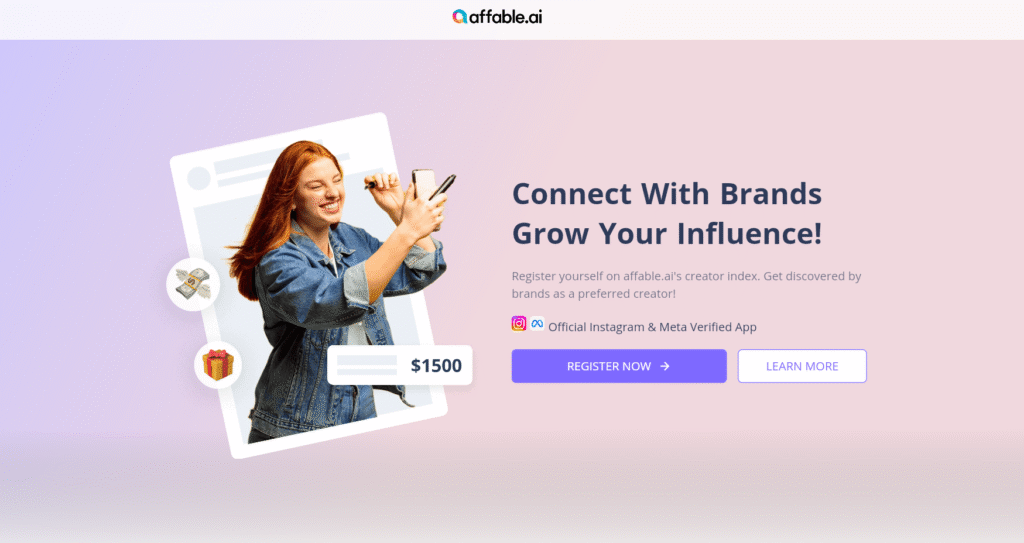
Sentiment and fraud checks keep things honest. The interface is friendly, and it’s great for brands wanting authentic regional insights. But outside Asia? Not as deep. If you want flavor and safety in one package, Affable.ai stands out from the crowd.
Core Features:
- Influencer discovery with AI audience profiling
- Sentiment analysis on influencer content
- Fraud and brand safety scoring
- Multilingual and regional market support
- Campaign performance dashboard
Pros:
- Strong for Asian and emerging markets
- Brand safety features reduce risk
- Content quality focus rather than just metrics
- User-friendly interface
Cons:
- Limited presence outside Asia
- Smaller database compared to global platforms
8. Post For Rent
Description:
Post For Rent’s vibe is friendly and practical. It’s an influencer marketplace powered by AI that matches brands with creators quickly. It focuses on smooth workflows communication, content approval, analytics. The fraud detection helps keep campaigns legit.
Great for mid-sized brands that need simplicity and transparency without breaking the bank. But don’t expect advanced predictive analytics or super large-scale campaign tricks. It’s the reliable helper you want for straightforward influencer marketing.
Core Features:
- Influencer marketplace with AI matching
- Communication and content approval workflow
- Fraud detection tools
- Engagement and ROI analytics dashboard
Pros:
- Focus on workflow and collaboration simplicity
- Good for medium-sized campaigns
- Transparent influencer vetting
- Affordable pricing options
Cons:
- Limited predictive analytics features
- Not the best fit for very large-scale campaigns
9. HypeAuditor
Description:
Fraud, bots, fake followers ugh. HypeAuditor is your fraud buster. Known for sharp fake account detection with AI that scans profiles deeply. You get detailed authenticity reports and demographic breakdowns.
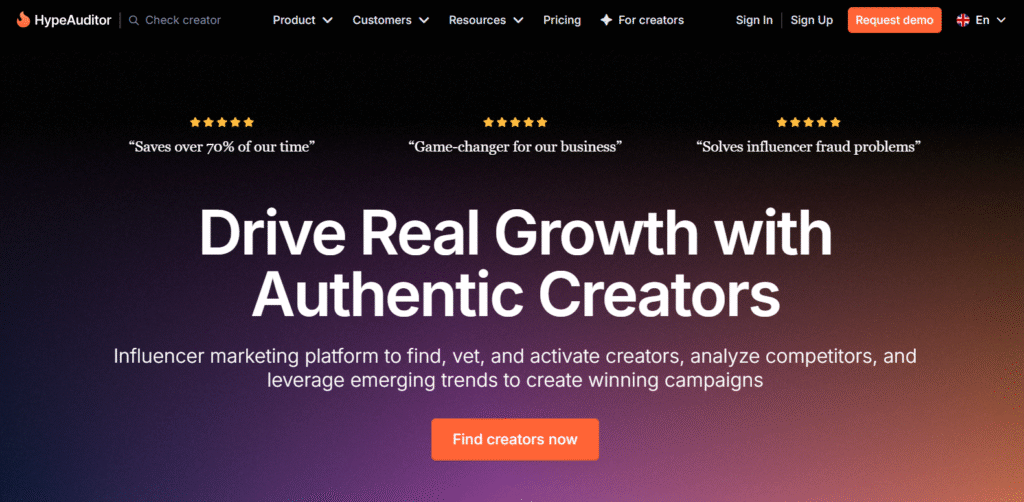
Agencies swear by it to vet before signing contracts. It’s heavy on analytics, light on campaign workflow features. If transparency and trust are your top worries, HypeAuditor’s a no-brainer. The price model might feel complex for newbies, but the accuracy? Worth it.
Core Features:
- AI-driven fake follower and bot detection
- Influencer audience demographics and authenticity reports
- Competitive benchmarking tools
- Campaign monitoring and fraud alerts
Pros:
- Industry-leading fraud detection accuracy
- Detailed influencer audits
- Easy-to-use web interface
- Trusted by agencies and brands worldwide
Cons:
- Focused primarily on analytics, less on campaign management
- Pricing structure may be complex for new users
10. Captiv8
Description:
Captiv8 blends influencer search with trend spotting kind of like having a finger on the pulse of social. It uses AI for smart discovery and sentiment tracking, helping you tap influencers who match current audience vibes.
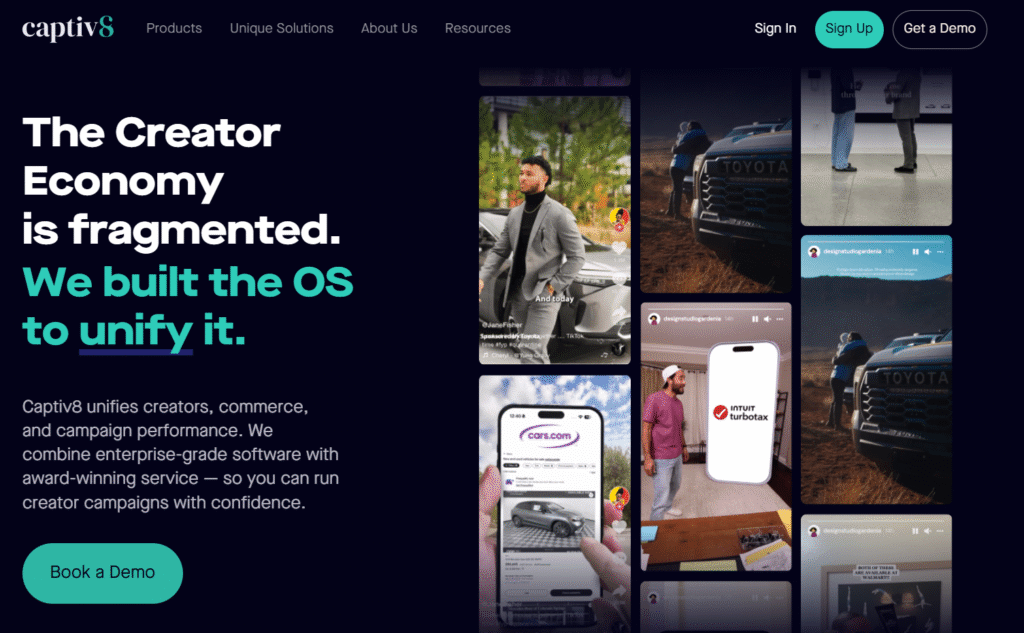
Plus, it supports smooth team collaboration and content approvals. It’s versatile for mid-to-large brands, but can be pricey and complex. If you’re into riding social waves with data backing your moves, Captiv8 delivers with style.
Core Features:
- AI influencer discovery with trend analysis
- Social listening and sentiment tracking
- Custom campaign workflows and approval processes
- ROI measurement and content performance analytics
Pros:
- Combines influencer and audience trend data well
- Strong campaign workflow management
- Suitable for both mid-size and large brands
Cons:
- Can be pricey for small businesses
- Complex interface for first-time users
11. Influencer.co
Description:
Simple, quick, and geared for small players that’s Influencer.co. It uses AI to match brands and influencers based on goals, speeding up connection time. Basic engagement analytics help keep things transparent.
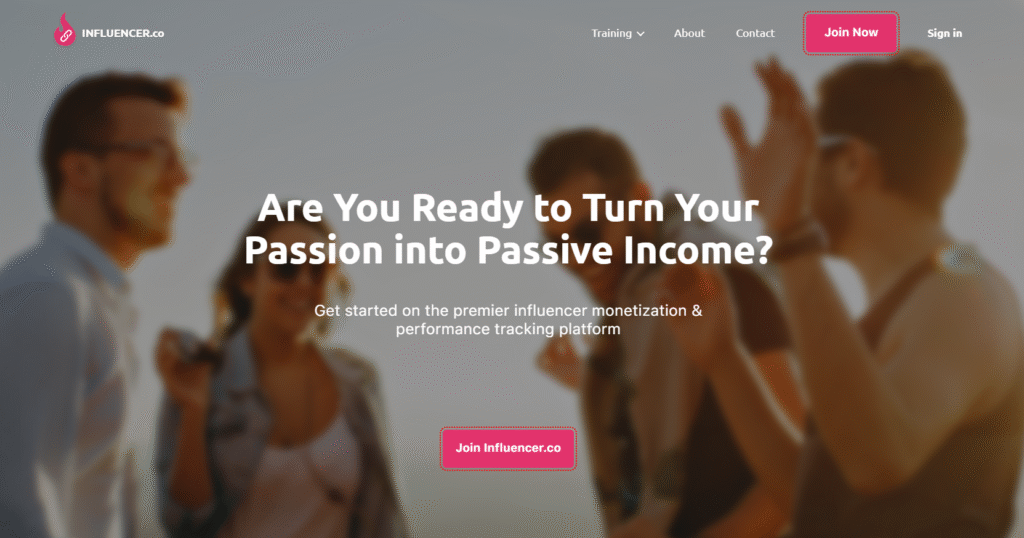
Plus, it manages campaigns and payments without fluff. It’s the go-to if you’re just starting out or budget-tight. Don’t expect the depth or large pools of bigger platforms. But for getting your feet wet, Influencer.co does the job without fuss.
Core Features:
- AI automated brand-influencer matching
- Basic audience engagement analytics
- Campaign management and messaging tools
- Simple contract and payment processing
Pros:
- Easy onboarding and quick use
- Affordable plans for newcomers
- Simplifies early-stage influencer marketing
Cons:
- Limited advanced analytics and fraud detection
- Smaller influencer pool
12. Mavrck (Later)
Description:
Mavrck is a community superstar. It’s built to uncover micro and nano influencers right from your existing customers turning fans into promoters using AI. Automates approval processes and rewards. Powerful performance stats let you see what’s working.
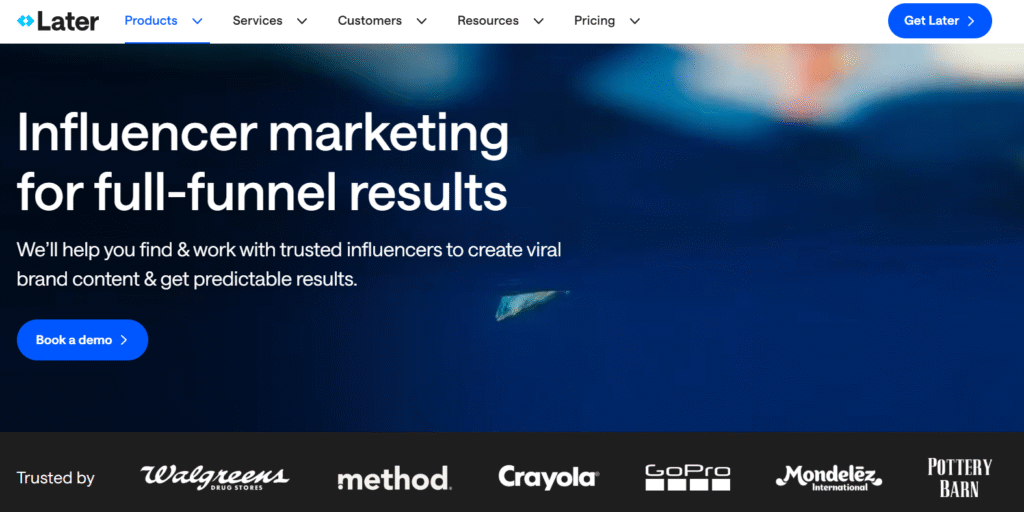
Perfect if you have a loyal base and want to amplify word-of-mouth authentically. Pricier than usual, and maybe overkill if you’re just launching. But for brands ready to leverage real community voices, Mavrck is innovative and impactful.
Core Features:
- AI-powered micro-influencer discovery from brand communities
- Automated content approval and management
- Influencer reward and activation systems
- Deep performance analytics
Pros:
- Great for community-based influencer marketing
- Streams workflow and influencer payments
- Strong data on influencer impact
Cons:
- Best suited for brands with existing customer bases
- Higher pricing tier
13. Neoreach
Description:
Neoreach flexes with a massive database and AI smarts that segment and optimize campaigns like a pro. It’s built for scale, ideal if you want niche influencer discovery plus automated workflows. Fraud detection keeps your spend honest. Neoreach is a favorite for agencies and major brands.
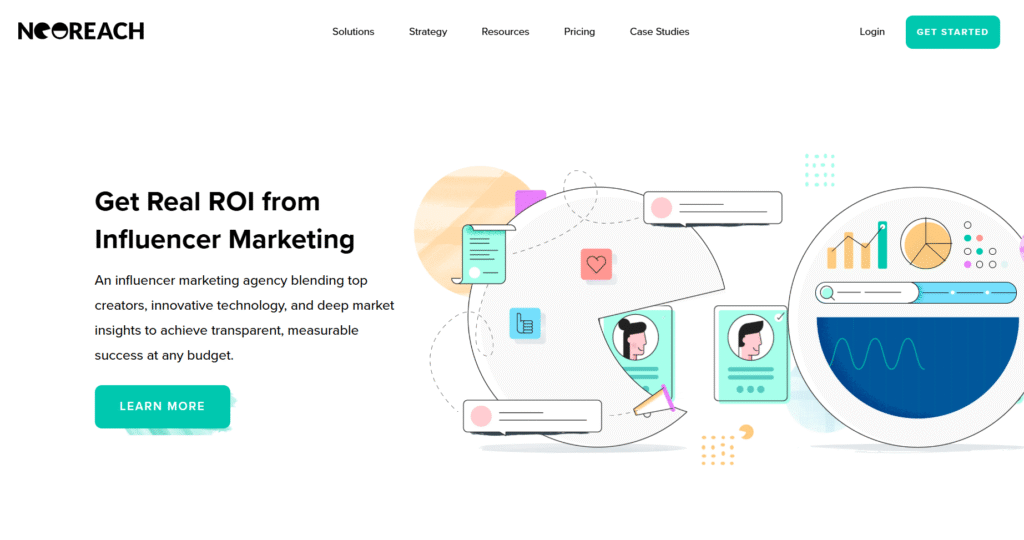
Cost is high, and onboarding takes time, but once set up, it’s a robust tool for serious influencer marketing. If you want power and breadth Neoreach’s got you covered.
Core Features:
- Extensive influencer database across multiple niches
- AI-driven segmentation and campaign optimization
- Fraud detection and audience quality checks
- Automated campaign workflows and analytics
Pros:
- Scalable for large campaigns
- Strong automation and insights
- Trusted by big brands and agencies
Cons:
- Expensive for small businesses
- Requires onboarding time
14. Julius
Description:
Julius makes influencer marketing straightforward, with AI-powered search and deep profiles. You get detailed audience analytics and easy campaign management workflows. Whether you’re an agency or brand of any size, Julius helps you make informed decisions.
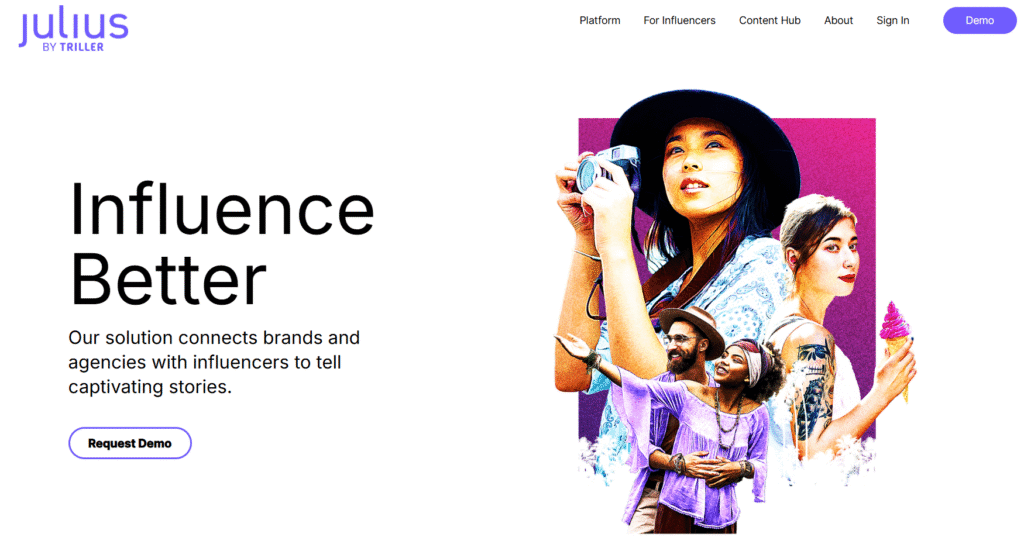
The UI is clean, but reporting can lag sometimes, and a few features cost extra. Still, it’s reliable, with strong influencer vetting and useful tools to keep campaigns on track without overcomplication.
Core Features:
- AI-curated influencer search and vetting
- Deep audience and engagement analytics
- Campaign and content workflow management
- Performance tracking and reporting
Pros:
- Strong influencer vetting and detailed profiles
- User-friendly campaign management tools
- Useful for agencies and brands of all sizes
Cons:
- Some features require additional fees
- Reporting can be slower than expected
If you’re looking to discover additional artificial intelligence tools, you might consider exploring the Pick AI Tool.
Conclusion
Harnessing the power of AI tools for influencer marketing dramatically improves efficiency, accuracy, and campaign outcomes. Whether you’re a small brand or an enterprise, the best tools from Influencity to Julius offer unique strengths such as smart influencer discovery, fraud detection, ROI forecasting, and seamless campaign management.
If you want to scale influencer marketing with real data-driven decision-making, these platforms provide exactly the AI-powered edge you need in 2025. Choose based on your budget, campaign complexity, and desired feature depth, and let AI guide your influencer campaigns to unprecedented success.
This expansive guide touches on the best AI-powered platforms that combine sophistication and usability helping you navigate the evolving influencer marketing landscape with the highest efficiency and impact.

Comments